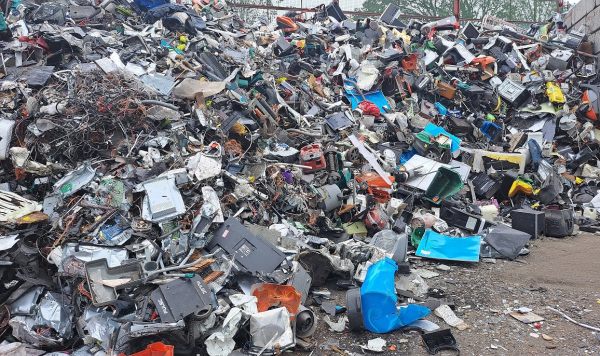More than half of Londoners have admitted to incorrectly disposing of old electricals in their household waste or recycling bins despite an alarming rise in fires sparked by lithium batteries.
Research carried out by North London Waste Authority (NLWA) also shows that 55% of residents have experienced signs of a damaged battery - which include overheating, swelling, hissing sounds, an unusual smell or smoke. Worryingly, almost a third of these people continued to use their device.
Lithium batteries, which are commonly found in rechargeable devices such as mobile phones, laptops, power tools and e-bikes, are particularly sensitive to high temperatures and crushing. This can lead to fires which spread quickly and are notoriously difficult to extinguish.
It comes as figures show there was a 200% increase in fires caused by lithium batteries at north London’s waste and recycling facilities in just eight months. Just six incidents were recorded in 2023, compared to 13 already this year. This includes a major fire at Waltham Forest’s South Access Road Reuse and Recycling Centre in May, which closed the site and took almost five hours to resolve.
Councillor Clyde Loakes MBE, Chair of NLWA, said: “Lithium battery fires release toxic fumes and can spark back up out of nowhere, so they pose a significant risk to our staff, buildings, equipment, the environment and general public.
“If they are hidden amongst other rubbish and recycling, batteries can easily be crushed or damaged, which is why it’s so important to use a designated recycling bin, drop off or collection point. From vapes to e-scooters, we have become increasingly reliant on technology containing these rechargeable batteries, so it is particularly worrying that there is so little awareness of just how dangerous they can be if you fail to take proper precautions.
“There is a clear role for the government to create a step-change in reducing the significant – and growing – risks these fires present, including by introducing enhanced producer responsibilities among manufacturers - without delay - to encourage appropriate and safe disposal.”
A survey of more than 1,000 Londoners also showed:
- Almost 60% have purchased a non-branded replacement charger for their electronic devices
- Three-quarters leave their devices on charge unattended overnight or for long periods of time
This is despite official guidelines stating that only recommended chargers should be used to ensure compliance with UK safety standards, with devices never left on charge unattended. They should also be kept out of direct sunlight and never overcharged.
The challenges associated with lithium battery disposal are currently being discussed as part of the Lithium-Ion Battery Safety Bill and have also been raised during the course of the Product Regulation and Metrology Bill. A consultation on reforms to UK battery regulations – including disposal – has been promised by the government, with NLWA calling for its urgent launch.







